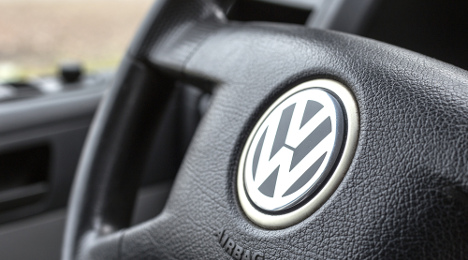VW has until April 21 to create ‘concrete’ diesel vehicle plan

By subscribing, you agree to receive communications from Auto Remarketing and our partners in accordance with our Privacy Policy. We may share your information with select partners and sponsors who may contact you about their products and services. You may unsubscribe at any time.
SAN FRANCISCO –
Volkswagen has until April 21 to submit a plan to federal regulators regarding how to fix or buy back vehicles included in the diesel emissions controversy; a situation that based on the estimates from Kelley Blue Book could cost the automaker more than $7 billion.
U.S. District Judge Charles Breyer on Thursday extended the deadline for VW to create a “concrete” proposal.
“Now, this proposal may include a vehicle buy-back plan or a fix approved by the relevant regulators that allows the cars to remain on the road with certain modifications or both or even other remedies,” Breyer said according to the court transcript posted after Thursday’s session.
“But whatever the proposal, by April 21, it must be specific and detailed as to proposed timing, what cars are involved in each proposal, payments to consumers and the like,” he continued. “I would hope by the 21st that as many outstanding issues as possible will be wrapped up, but at least the issues of what is to be done with these cars must be resolved by that date.”
If the automaker can’t meet that next deadline, the OEM could face even more challenges.
“On the other hand, being the unbridled optimist that I am, I have to interject a note of pessimism in that if no concrete proposal is made by April 21, then on that date, the court will set a schedule for determining whether the claims for declaratory, injunctive, and equitable relief can be resolved this summer,” Breyer said.
Subscribe to Auto Remarketing to stay informed and stay ahead.
By subscribing, you agree to receive communications from Auto Remarketing and our partners in accordance with our Privacy Policy. We may share your information with select partners and sponsors who may contact you about their products and services. You may unsubscribe at any time.
“In other words, as suggested by plaintiffs, the court would seriously consider whether to hold a bench trial this summer on such relief so that the polluting cars can be addressed forthwith,” he continued. “No one in this courtroom today needs to address that issue now as I am hopeful that by April 21, the need for a bench trial will be moot.
“I understand, because I've received it, that the parties' proposed agenda includes a number of additional items related to the progress of discovery and similar issues. However, in light of the substantial progress on a resolution as has been reported to me, I do not believe that any of these issues need to be addressed today. However, each will be addressed at the April 21 status conference if a concrete and detailed proposal for getting the polluting cars fixed or off the road is not presented by then,” the judge went on to say.
KBB and Autotrader investigated the potential cost if all the vehicles were to be purchased back by Volkswagen, and provided an analysis to the media. According to Kelley Blue Book, based on KBB private-party values as of Sept. 24, if VW were to buy back vehicles, the following figures would be the estimated cost based on the generation of the engine. The amounts are covering only on U.S. vehicles.
Generation No. 1: $4.4 billion
Generation No. 2: $1.6 billion
Generation No. 3: $1.3 billion
Total: $7.3 billion
“Volkswagen can’t move past its diesel challenge until a solution is confirmed for all cars that don't meet current standard,” Kelley Blue Book senior analyst Karl Brauer. “While any fix for these vehicles will be complex and costly, every delay extends the timeframe to get past this scandal and on to rebuilding the brand.”
Fellow KBB analyst Akshay Anand added, “A delayed deadline hints that this fix is complex. Regardless, Volkswagen needs a fix and time is of the essence. The longer it takes, the more the brand is damaged by the day.”
Autotrader senior analyst Michelle Krebs offered this insight: “Volkswagen clearly needs to get this fix for its diesel cars right, but it also needs to move faster and stop kicking the can down the road.”
To recap, here are the vehicles included in the matter:
Generation No. 1
2009-2014 VW Jetta Sedan and Jetta SportWagen TDI
2010-2014 Golf TDI
2012-2014 Beetle TDI
Generation No. 2
2012-2014 VW Passat TDI
Generation No. 3
2015 Jetta TDI
2015 Golf TDI and SportWagen
2015 Passat TDI
2015 Beetle TDI


